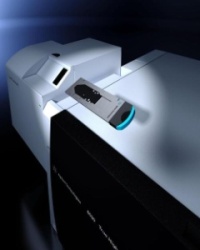Agilent Technologies Inc. (NYSE:A) today introduced a new HPLC-Chip to address N-glycan analysis in the emerging biopharmaceutical market.
 The mAb-Glyco-Chip is designed for the analysis of N-glycans associated with monoclonal antibody molecules.
The mAb-Glyco-Chip is designed for the analysis of N-glycans associated with monoclonal antibody molecules.
The mAb-Glyco-Chip is designed for the analysis of N-glycans associated with monoclonal antibody molecules. N-glycans and monoclonal antibody molecules are a critical part of biopharmaceutical research and analysis. A unique product for a specific requirement, the mAb-Glyco-Chip improves the productivity of biopharmaceutical analysis at least 20 times when compared to the current CE-FLD method, and at least five times when compared to the current MALDI-MS method.
“The mAb-Glyco-Chip offers dramatic productivity improvements and addresses a growing need in the biopharmaceutical analysis market,” said Patrick Kaltenbach, general manager for Agilent’s Liquid Phase Separations Business. “Our growing portfolio of HPLC-Chip/MS solutions is an indication of our commitment to advancing microfluidic LC workflows. The launch of this new chip is a wonderful way to celebrate five years of success in the commercial microfluidic LC market.”
Conventional methods of N-glycan analysis, such as LC-FLD or CE-FLD, can take two to three days for completing one single analysis. The new HPLC-Chip/MS workflow significantly reduces the total analysis (including on-chip enzymatic reaction, glycan separation and MS analysis) to tens of minutes. This creates a major productivity enhancement for biopharmaceutical analysis. Coupled with an Agilent Accurate Mass TOF or Q-TOF mass spectrometer, the combined system allows for complete, rapid characterization and quantitative profiling of glycan structures on recombinant antibodies.
The Agilent 1200 Series HPLC-Chip/MS system is a microfluidic chip-based technology for nanospray LC/MS. Agilent pioneered the HPLC-Chip/MS concept in 2005, combining nanoflow HPLC columns, and connecting capillaries and a spray emitter, into a re-useable, credit card-size device. This allowed the advantages of high-sensitivity and low-sample consumption provided by nano LC/MS to be accessible to scientists without the troublesome setup involving microvalve, fittings and capillary tubing of conventional nano LC.
Agilent now offers 13 versions of HPLC-Chips. All Agilent HPLC-Chips are compatible across the entire portfolio of Agilent mass spectrometers for applications that include, but not limited to, peptide quantitation, biomarker discovery, targeted phosphopeptide analysis, glycan and Monoclonal Antibody characterization, and small molecule DMPK studies. In addition, Agilent’s custom chip program delivers customized solutions to individual needs.
Source: http://www.home.agilent.com/